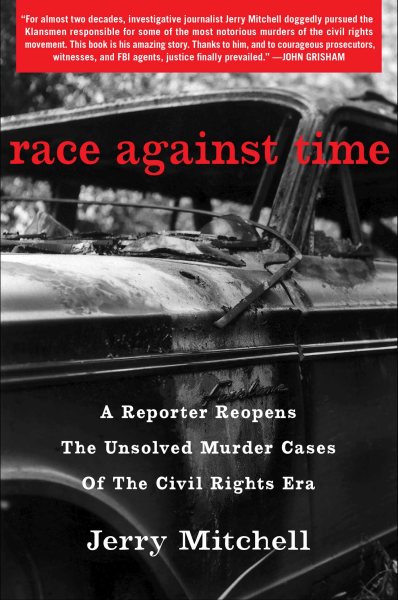Interview by Jana Hoops. Special to the Clarion-Ledger Sunday print edition (February 2)
 An assignment to cover the press premiere of a movie 30 years ago would bring a decades-old Mississippi murder case back into the nation’s spotlight–and change the life of not only court reporter Jerry Mitchell, but untold numbers of many who thought justice would never come.
An assignment to cover the press premiere of a movie 30 years ago would bring a decades-old Mississippi murder case back into the nation’s spotlight–and change the life of not only court reporter Jerry Mitchell, but untold numbers of many who thought justice would never come.
A staff writer for The Clarion-Ledger in 1989 when he attended the press screening of the blockbuster Mississippi Burning film in Jackson, Mitchell inadvertently found himself sitting near two veteran FBI agents and a seasoned journalist who had all been involved with the 1964 murder investigations portrayed in the movie.
The conversations he held with his seatmates after the movie would be the springboard of a career dedicated to pursuing justice for some of the nation’s most infamous cold case murders of the civil rights movement.
Mitchell was stunned to find out that night that none of the 20 Ku Klux Klansmen involved in the deaths of three civil rights workers had been brought to trial. He soon decided to take on the task of investigating–and ultimately reopening–the case himself.
His career memoir, Race Against Time: A Reporter Reopens the Unsolved Murder Cases of the Civil Rights Era recounts nearly 20 years of investigations of four notorious cases that helped send four Klansmen and a serial killer to prison.

Jerry Mitchell
Mitchell’s work has earned him the title of “one of the most decorated investigative journalists in the country,” with more than 30 national awards to his credit. A Pulitzer Prize finalist, he was the recipient of a MacArthur “Genius Grant,” Columbia’s John Chancellor Award, the George Polk Award, and many others.
After more than 30 years as an investigative reporter for The Clarion-Ledger, Mitchell founded the Mississippi Center for Investigative Reporting in Jackson in 2019, providing investigative reporting to news outlets and with a goal to “train up the next generation of investigative reporters.”
Below he shares some insights about his career, his new book, and his hopes for the future of investigative journalism.
As a young person, what influenced your interest in journalism, and, specifically, investigative reporting?
My mother had me reading three newspapers a day by the time I was 7. I had no choice! I first experienced journalism in high school and soon gravitated to investigative reporting. Reading All the President’s Men inspired me and made me want to expose wrongdoing and right wrongs. I guess I’ve been doing it ever since.
Tell me about the movie that spurred your interest in the decades-old cold cases of murderers who had never been brought to justice, and why that film prompted you to begin a journey that would take almost as long to right those wrongs.
Watching the film Mississippi Burning outraged me. How could more than 20 Klansmen kill three young men and never be tried for murder? It made no sense. In addition, I saw the movie with two FBI agents who investigated the case and a journalist who covered the case. Watching the film with them made all the difference because they gave me the full story of what happened. That really kickstarted my investigation into the Mississippi Burning case and those that followed.
The late Pulitzer Prize winning author/journalist David Halberstam once called your work “a reflection of what a reporter with a conscience can do,” and Race Against Time has been described as “a remarkable journalistic detective story and a vital piece of American history.” That said, who should read this book, and why?
I would hope anyone who likes to read true crime or true detective stories would enjoy the book. How these horrible killings came to trial decades later is a fascinating tale. Prosecutors, investigators, FBI agents and others all deserve a tremendous amount of credit for piecing these cases together against impossible odds. Most important, the book tells the story of these courageous people in the civil rights movement and their families, who never gave up hope, never stopped believing. They continue to inspire me.
Where do you think Mississippi–and our country–stand today in the journey to racial equality?
Our journey to racial equality in this nation seems to have always been one of a few steps forward and a few steps back. It seems lately we have been taking steps back with white supremacy and white nationalism on the rise. My hope is that we, as a nation, can begin to see what brings us together, rather than what tears us apart. We need each other. Now more than ever.
Please tell me about the Mississippi Center for Investigative Reporting, the nonprofit that you started, and why investigative reporting is especially important in today’s world.
Newsrooms are vanishing across the nation and especially Mississippi. That’s why we started the Mississippi Center for Investigative Reporting in 2019. We provide newspapers and news outlets with investigative reporting they don’t have the money or manpower to do. We provide news outlets with stories that make a difference. For example, we reported on the powerful control of gangs in Mississippi prisons months before this gang war resulted in the killings of five and countless injuries.
We believe in shining a light into the darkness. We believe in exposing corruption. We believe in telling the truth because the truth still matters. We hope others will join us and help support this valuable mission. Our new offices are located on the Millsaps College campus, where we will begin working with college students in Mississippi. Our goal is to train up the next generation of investigative reporters.
Lemuria has selected Race Against Time its February 2020 selection for its First Editions Club for Nonfiction.
Jerry Mitchell will be Lemuria on Tuesday, February 4, beginning at 4:00 p.m. to sign copies of Race Against Time.
Michell will return on Wednesday, March 18, to sign books at 4:30 p.m., before joining in a conversation at 5:00 p.m. with Rena Evers-Everette, daughter of the late civil rights leader Medgar Evers.


Comments are closed.